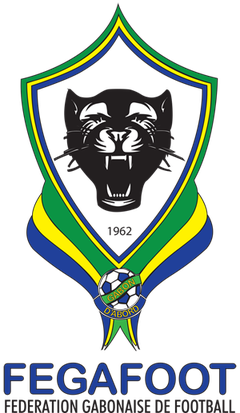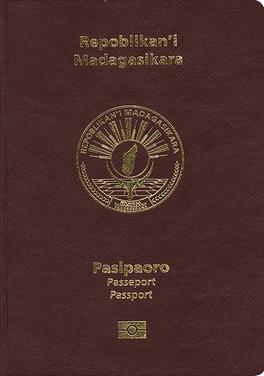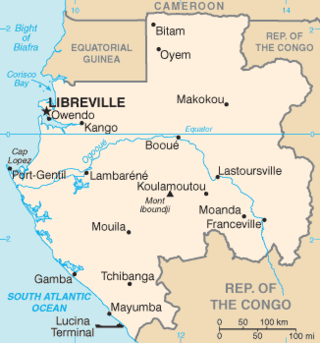Related Research Articles

Gabon, officially the Gabonese Republic, is a country on the west coast of Central Africa. Located on the equator, it is bordered by Equatorial Guinea to the northwest, Cameroon to the north, the Republic of the Congo on the east and south, and the Gulf of Guinea to the west. It has an area of nearly 270,000 square kilometres (100,000 sq mi) and its population is estimated at 2.3 million people. There are coastal plains, mountains, and a savanna in the east.
Little is known of the history of Gabon prior to European contact. Bantu migrants settled the area beginning in the 14th century. Portuguese explorers and traders arrived in the area in the late 15th century. The coast subsequently became a center of the transatlantic slave trade with European slave traders arriving to the region in the 16th century. In 1839 and 1841, France established a protectorate over the coast. In 1849, captives released from a captured slave ship founded Libreville. In 1862–1887, France expanded its control including the interior of the state, and took full sovereignty. In 1910 Gabon became part of French Equatorial Africa and in 1960, Gabon became independent.

Fantasy literature is literature set in an imaginary universe, often but not always without any locations, events, or people from the real world. Magic, the supernatural and magical creatures are common in many of these imaginary worlds. Fantasy literature may be directed at both children and adults.
Ondo may refer to:

The Gabonese Football Federation is the governing body of football in Gabon. It was founded in 1962, affiliated to FIFA in 1966. It organises the national football league, as well as the men's and women's national teams.

Parliamentary elections were held in Gabon on 17 December 2006, although voting in seven seats took places on 24 December 2006 due to logistical problems. The ruling Gabonese Democratic Party (PDG) won 82 seats, with other parties that supported President Omar Bongo winning another seventeen seats, among them the National Woodcutters' Rally of Paul M'ba Abessole with seven seats, the Democratic and Republican Alliance with three seats, the Circle of Reformist Liberals with two seats and the Social Democratic Party with one seat.
Patrick N'Guema N'Dong was a French-Gabonese journalist on Gabon's Africa N°1 radio station, which is transmitted through French Africa and France. He was known for his two programs devoted to the occult sciences, parapsychology, and traditional African religions.
Imunga Ivanga is a Gabonese filmmaker.

Gabonese passports are issued to Gabonese citizens to travel outside Gabon.

The Malagasy passport is issued to citizens of Madagascar for international travel.

The 1964 Gabonese coup d'état was staged between 17 and 18 February 1964 by Gabonese military officers who rose against Gabonese President Léon M'ba. Before the coup, Gabon was seen as one of the most politically stable countries in Africa. The coup resulted from M'ba's dissolution of the Gabonese legislature on 21 January 1964, and during a takeover with few casualties 150 coup plotters arrested M'ba and a number of his government officials. Through Radio Libreville, they asked the people of Gabon to remain calm and assured them that the country's pro-France foreign policy would remain unchanged. A provisional government was formed, and the coup's leaders installed Deputy Jean-Hilaire Aubame, who was M'ba's primary political opponent and had been uninvolved in the coup, as president. Meanwhile, M'ba was sent to Lambaréné, 250 kilometres (155 mi) from Libreville. There was no major uprising or reaction by the Gabonese people when they received word of the coup, which the military interpreted as a sign of approval.
AS Sogara is a Gabonese football club based in Port-Gentil.

Parliamentary elections were held in Gabon on 17 December 2011. Amidst an opposition boycott, the ruling Gabonese Democratic Party (PDG) won a landslide victory; official results were announced on 21 December 2011, showing that the PDG won 113 out of 120 seats, the most it had won since the beginning of multiparty politics in the early 1990s. A few other parties won the handful of seats remaining: the Rally for Gabon (RPG) won three seats, while the Circle of Liberal Reformers (CLR), the Independent Centre Party (PGCI), Social Democratic Party (PSD), and the Union for the New Republic (UPRN) won a single seat each.

The Embassy of Gabon in Washington, D.C. is the diplomatic mission of the Gabonese Republic to the United States. It is located at 2034 20th Street Northwest, Washington, D.C. in the Adams Morgan neighborhood.

Njebi is a Bantu language spoken in Gabon and the Republic of Congo.
Justine Mintsa is a Gabonese writer and member of the Fang people. She is the third child of twelve siblings. She earned her doctorate in English Literature from the University of Rouen in 1977. She is a member of the Haut Conseil de la francophonie. She was the first African woman to publish a novel with Éditions Gallimard, in Paris.
Nadège Noële Ango Obiang, born on December 20, 1973 in Libreville in Gabon is a Gabonese writer. Her literary works include short stories, drama, romance, pictures, scripts and poetry. Obiang has a university degree in Economics. She combines the two professions of being a writer and an economist.
Honorine Ngou is a Gabonese writer and academic.

Gabonese Olympic Committee is the National Olympic Committee representing Gabon.
Alex Yowan Kevin Moucketou-Moussounda is a Gabonese professional football player who plays for Cypriot club Aris Limassol FC and the Gabonese national team.
References
- ↑ "Gabonese literature at a glance" . Retrieved 12 December 2015.